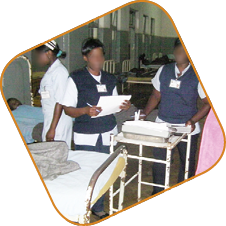7(D). De-habilitation
When you refuse medication, it’s forced.
 Photo: Women from Church of Zambia praying for female patient in the B Ward in Chainama Hospital. 30 October 2012 © MDAC.
Photo: Women from Church of Zambia praying for female patient in the B Ward in Chainama Hospital. 30 October 2012 © MDAC.
At Chainama Hills Hospital, a patient told monitors that staff, “give you whatever medication they want. You have no choice.” With so few resources, clinical care is often poor. Staff informed monitors that there was a high incidence of drug and alcohol abuse by male patients: some estimated that two thirds of male patients abused drugs or alcohol,135 a claim which was impossible for monitors to test, as no data is kept. From a human rights standpoint, it is alarming that the majority of patients seemed to be detained against their will simply for substance misuse, perhaps in the absence of mental health issues.
Monitors observed that in-patient treatment was overwhelming dominated by pharmacology: therapeutic supports ranged from minimal to non-existent. Electro-convulsive therapy was carried out at Chainama Hills Hospital until 2012 when the ECT machine was de-commissioned (a new one had been ordered). Patients were not given any choice over whether to accept medication, or what sort of medication to take. A patient at Chainama told monitors:
When you refuse medication, it’s forced, and in order for you to be discharged you just have to cooperate. If not, the report that will be written will keep you in the facility.
In all hospitals staff told monitors they forced treatment on patients. At Chipata a staff member said, “most patient refuse to take drugs. When they refuse you mobilise people to manhandle them, then you administer the drug as injection. This happen almost every day.”
In all hospitals nursing and clinical officers were too few in number and too overworked to offer individual attention to patients. Instead they focused on administering drugs and managing the ward. Occupational therapy activities were minimally available, for example to a handful of in-patients a day at Chainama. At provincial hospitals the activities available amounted to little more than watching television or working in the garden (such as at Chipata). Occupational therapy was completely absent at Kabwe where staff said there is no space.
Monitors saw televisions at Ndola’s occupational therapy room, one on the wards at Chipata, and one at Chainama rehabilitation wards, with another in the nurses’ room on the acute wards. Newspapers and telephones were nowhere available for patients. Patients in closed wards told monitors that they could not contact their families or friends unless a nurse was kind enough to lend them their own mobile phone. Many patients pleaded for phones from monitors to make calls.
No books, pens or paper were available. There were no leaflets or any other information on mental health, human rights or anything else, clearly constituting a restriction of freedom of expression.136 Other inappropriate practices infringing on the rights of patients were also witnessed. At Kabwe hospital monitors witnessed a visiting chaplain try to convert a patient of a different faith.137
Food consisted of porridge for breakfast, beans and nshima138 for lunch, and beans and cabbage for dinner. Only exceptionally were other food items – like meat, fruit or vegetables – provided.139 There was no variety in diet, nor any nutritional oversight. This is particularly concerning as some people are detained for months or years – and, in some cases, for decades.
None of the patients on any of the psychiatric wards had access to a kitchen, with the exception of a few female patients at Chainama Hills Hospital as a form of occupational therapy. Very few wards had cabinets for patients to keep their possessions, and the few that did exist were often removed by staff on the pretext of preventing damage. During monitoring visits, most patients were observed to be sleeping or resting on a bed, while others wandered around the ward. One patient at Chainama Hills Hospital B-ward encapsulated the boredom which characterises in-patient admission: “At six in the evening they send you to bed for more sleeping.”
135 Interview with the Head of Clinical Care and Psychiatrist, Chainama Hills Hospital, 3 January 2014.
136 Article 21 of the CRPD states that governments must, “take all appropriate measures to ensure that persons with disabilities can exercise the right to freedom of expression and opinion, including the freedom to seek, receive and impart information and ideas”.
137 Article 18 of the International Covenant on Civil and Political Rights states that “[e]veryone shall have the right to freedom of thought, conscience and religion. […] No one shall be subject to coercion which would impair his freedom to have or to adopt a religion or belief of his choice.”
138 Food made from ground maize.
139 There were reports that chicken was available once a week at Kabwe.

